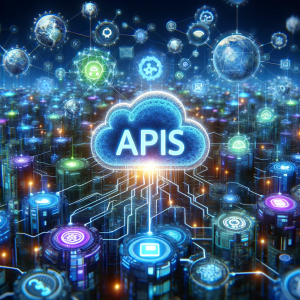Welcome to Leaware’s insight website! I’m Carlos, and today we’re diving into the transformative world of APIs (Application Programming Interfaces) in 2024. Let’s explore how these digital linchpins are redefining business operations globally.
The API Economy: Weaving the Digital Tapestry
APIs have evolved from mere technical tools to pivotal business assets, crucial in driving innovation, scalability, and agility. They are like arteries in the digital world, pumping data and functionality, enabling disparate systems to communicate and function cohesively. The Postman blog reveals a staggering growth in API usage, with the number of Postman Collections soaring from less than half a million in 2016 to over 46 million by 2021. Furthermore, the global API management market, valued at USD 5.52 billion in 2023, is projected to grow significantly, showcasing the robust trajectory of the API market.
API-First Strategy: The New Business Foundation
As we venture deeper into the digital era, particularly in 2024, the landscape of business strategy has undergone a monumental shift. The API-First strategy, once a peripheral concept, has now taken center stage, redefining the very foundation upon which businesses are built. This paradigm shift signifies a crucial evolution in the approach to digital infrastructure and strategy.
Understanding the API-First Strategy
API-First is a strategy where the development of APIs (Application Programming Interfaces) takes precedence in the business planning process. It means that APIs are not just an addition to existing systems; they are the core around which systems, applications, and strategies are developed. This approach ensures that businesses can easily integrate with other systems and services, providing a seamless experience for both the users and developers.
Why API-First Matters Now More Than Ever
- Seamless Scalability and Integration: APIs enable businesses to expand and adapt with ease. They allow different software and systems to communicate with each other, breaking down barriers to growth and innovation.
- Revolutionizing Business Models: The API-First approach fosters a platform-based model, encouraging innovation and collaboration. It turns businesses into ecosystems where external and internal developers can contribute, leading to a more dynamic and inclusive growth environment.
- APIs as the DNA of Digital Business: Just like DNA is essential to the growth and functioning of living organisms, APIs have become integral to the growth and functionality of businesses. They underpin every digital process, defining how businesses interact with the digital world.
The Impact on Industries
Across various industries, the API-First strategy is reshaping business operations. In retail, for example, APIs enable the integration of e-commerce platforms with various digital payment systems and logistical services, streamlining the online shopping experience. In finance, APIs facilitate secure data sharing between institutions, revolutionizing how we approach banking and investment services.
Challenges and Considerations
While the API-First strategy offers numerous benefits, it also presents challenges, such as the need for robust API management and security. Ensuring data privacy and maintaining system integrity are paramount in this approach.
The Future of API-First Strategies
Looking ahead, the API-First strategy is set to become even more crucial. As technologies like AI and machine learning continue to evolve, APIs will play a vital role in integrating these technologies into existing business frameworks, driving further innovation and growth.
Are you ready to unlock the full potential of APIs for your business in 2024? Contact Leaware today for a complimentary, expert consultation. Discover how embracing the API Economy can revolutionize your business operations, enhance customer interactions, and set you on a path of innovative growth. Don’t miss out on this opportunity to transform your business model and stay ahead in the competitive digital landscape.
Typical topics we cover during consultation:
The AI-Driven Data Feast via APIs
In 2024, APIs are essential in serving diverse, real-time data to AI systems. They bridge the gap between varied data sources and AI, enabling smarter decisions and adaptive learning. This synergy is critical in industries like healthcare for predictive diagnostics, finance for real-time fraud detection, and retail for personalized customer experiences.
Hybrid Integration Platforms: Merging Legacy and Modernity
In today’s rapidly evolving digital landscape, businesses face the challenge of integrating their established legacy systems with cutting-edge cloud technologies. This is where Hybrid Integration Platforms (HIPs) come into play, offering a robust solution for this critical need. These platforms have emerged as essential tools in the journey of digital transformation, adeptly merging the reliability of traditional systems with the agility and scalability of modern cloud solutions.
Understanding Hybrid Integration Platforms
Hybrid Integration Platforms are essentially systems that allow different types of software, both on-premises and in the cloud, to communicate and work together seamlessly. They are designed to bridge the gap between older, legacy systems that a business may have been using for years, and newer, cloud-based services that offer greater efficiency and flexibility.
The Need for Hybrid Integration
Many businesses have a significant investment in their legacy systems, which contain valuable data and perform critical business functions. However, these systems often lack the flexibility and scalability that modern cloud solutions provide. This is where HIPs become invaluable. They enable businesses to take advantage of the latest technological advancements without discarding their existing infrastructure.
Benefits of Hybrid Integration Platforms
- Seamless Integration: HIPs allow for smooth communication between disparate systems, ensuring that data flows freely and processes operate without interruption.
- Cost Efficiency: By integrating rather than replacing legacy systems, businesses can avoid the high costs associated with a complete overhaul of their IT infrastructure.
- Enhanced Agility: With HIPs, businesses can quickly adapt to market changes and new technological advancements, staying ahead in a competitive landscape.
- Improved Data Management: These platforms enable better handling of data, allowing businesses to gain more insights and make informed decisions.
- Risk Mitigation: Hybrid Integration reduces the risks associated with complete migration to the cloud, such as data loss or system incompatibility.
Challenges in Implementing Hybrid Integration Platforms
While HIPs offer numerous benefits, their implementation is not without challenges. These include ensuring data security across different environments, managing the complexities of integrating various systems, and training staff to effectively use the new hybrid system.
The Future of Hybrid Integration
As businesses continue to navigate the complexities of digital transformation, Hybrid Integration Platforms are expected to become even more sophisticated. They will likely incorporate advanced features like AI and machine learning to enhance automation and predictive analytics, further empowering businesses to innovate and grow.
API Cybersecurity: Ensuring Digital Trust
API security has evolved into a cornerstone of digital trust. Industries from finance to healthcare rely heavily on API security to safeguard digital assets and ensure business continuity. In this digital age, API security is about building impenetrable digital fortresses.
Example:
Consider the finance sector, where APIs manage everything from customer transactions to sensitive financial data. A breach here can mean catastrophic financial losses and a severe erosion of customer trust. Similarly, in the healthcare sector, APIs handle sensitive patient data, where a security lapse can have serious implications on privacy and patient care.
Building Impenetrable Digital Fortresses
In the digital age, constructing an API security strategy is akin to building a fortress. It involves multiple layers of defense, each designed to thwart potential breaches. This includes:
- Encryption: Ensuring that data, while in transit and at rest, is encrypted, making it unreadable to unauthorized users.
- Access Control: Strictly managing who has access to what data, often through robust authentication and authorization mechanisms.
- Regular Audits and Monitoring: Continuously monitoring API activity to detect and respond to unusual patterns or potential threats.
- API Gateways: Employing API gateways as a buffer between users and backend services, adding an extra layer of security.
- Compliance and Standards: Adhering to international security standards and regulations to ensure best practices are followed.
The Future of API Cybersecurity
As we look towards the future, the role of API security is set to become even more integral. With the advent of technologies like AI and Machine Learning, API security strategies are evolving to be more adaptive and intelligent.

APIs as Products: A Customer-Centric Approach
APIs have transcended their technical origins, emerging as full-fledged products that redefine user interaction with technology. They are now designed with an unwavering focus on the end-user, ensuring seamless and intuitive experiences. This customer-centric approach has led to APIs becoming the face of businesses in the digital age.
The Dawn of a New Digital Era
As we stand in 2024, it’s clear that the API Economy has reshaped the digital landscape. APIs have become the fundamental building blocks, facilitating a level of integration and functionality that touches every aspect of our lives. They are not just facilitating current technologies but are paving the way for future innovations. The API Economy signifies a cultural shift, embracing agility, adaptability, and collaboration.
Thank you for joining us on this insightful journey into the API Economy of 2024. Stay tuned for more updates on how technology is shaping our world.
Interested in understanding how the API Economy can revolutionize your business in 2024? Contact Leaware for a free consultation and discover the endless possibilities APIs offer in transforming your business operations and customer interactions. Contact Us for a Free Consultation. We also want to invite you to watch our insightful video about APIs


